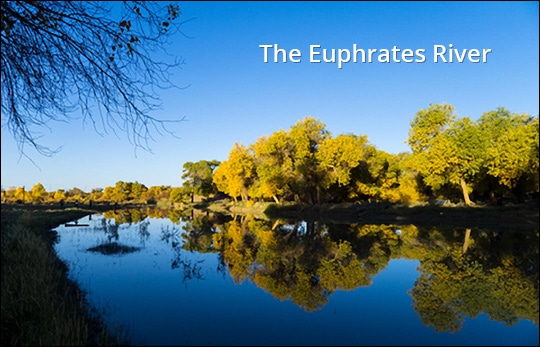Bible Question:
Why is the Greek name Euphrates in the Bible before Greece existed?
Bible Answer:
In Genesis 2:10-14 we are told that there were four rivers that flowed through the Garden of Eden and the fourth one was the Euphrates River.
The name of the third river is Tigris; it flows east of Assyria. And the fourth river is the Euphrates. Genesis 2:14 (NASB)
The name Euphrates also occurs in Genesis 15:18; 31:21 and 36:37. The question before us is why does the name Euphrates river appear in Genesis 2:14 since it is a Greek name for the river? How did this occur since Greece came into existence after the Garden of Eden?

Genesis Uses The Hebrew Name For The Euphrates River
The answer to the question is that the Hebrew Bible or Old Testament was written in Hebrew and not Greek. The Hebrew word for the Euphrates River in Genesis 2:14 is פְּרָת or prat. But the Greek name for the Euphrates River, euphrates, is not used in Genesis 2:14. However, the Greek name for the Euphrates River does appear in the New Testament in Revelation 9:14 and 16:12.
Genesis Was Written When Greece Already Existed
It is important to know that the book of Genesis was not written at the time the Garden of Eden existed. The book of Genesis was written thousands of years later. Even if Moses had used the Greek name for the Euphrates River in Genesis 2:14, it still would not have been an issue since the Greek civilization was already developing when the book of Genesis was written. This includes the Greek language. The etymology of the Greek name for the Euphrates River can be traced back to the Old Persian Ufrâtu language, the Assyrian Purattu D, and the Akkadian language.[1, 2]
Historical data teaches that the Greek culture was recognized as early as 3000 B.C.[3] The Greek civilization developed gradually. Historical records indicate that Greece was invaded by inhabitants from Asia Minor. Later Greece invaded Asia Minor. The spread of Greek culture and its language was in process as early as 3000 B.C. and continued down to the classical Greek era of 500 B.C.
The Greek language was in development prior to the Mycenaean culture. It was known as Mycenaean Greek (15th century).[4] Thus the Greek language was in development before 1500 B.C. Therefore, the Greek name for the Euphrates River and was most likely known in Egypt.
It is estimated that the book of Genesis was written by Moses about 1455 BC to 1405 BC.[5] Liberals push for a later date in the 4th or 5th century. However, the archaeologist David M. Rohl has demonstrated,
The Pharaoh of the Exodus may be identified with Pharaoh Dudimose, thirty-sixth ruler of the 13th Dynasty, in whose reign, according to Manetho, “God” smote the Egyptians. The earth-pits found at the end of Tell ed-Daba stratum G/1 might provide some archaeological evidence for the disasters associated with the Tenth Plague of the Exodus.[6]
Since Pharaoh Dudimose reigned about 1448 B.C., the estimated date of 1450 to 1400 B.C. is reasonable. Therefore, we can place the Exodus at about 1450 B.C.. The book of Genesis was written after the exodus since it documents the events that occurred both before and after the Israelites left Egypt. Since Moses wrote the book, it was written before his death in 1400 B.C.
Conclusion:
The Greek name for the Euphrates River does not appear in the original Hebrew Bible since the book of Genesis was written in Hebrew. There are no Greek words in the Hebrew Bible or Old Testament Scriptures. Even if the book of Genesis had been written in Greek and the Greek word for the Euphrates was present, we have shown that would not be an issue since the book of Genesis was written at the same time the Greek culture existed.
References:
1. Francis Brown, Samuel Rolles Driver, and Charles Augustus Briggs, Enhanced Brown-Driver-Briggs Hebrew and English Lexicon (Oxford: Clarendon Press, 1977), 832.
2. Euphrates (en.wiktionary.org/wiki/Euphrates).
3. Peter Stearns. The Encyclopedia of World History. Houghton Mifflin Company. 2001. 6th edition. pp.56-70.
4. Greek language (en.wikipedia.org/wiki/Greek_language).
5. John MacArthur. The John MacArthur Study Bible ESV. Crossway. 2010. p. xxiv, 13.
6. David M Rohl. Pharoahs and Kings. Crown Publishers. 1995. pp. 280-284.